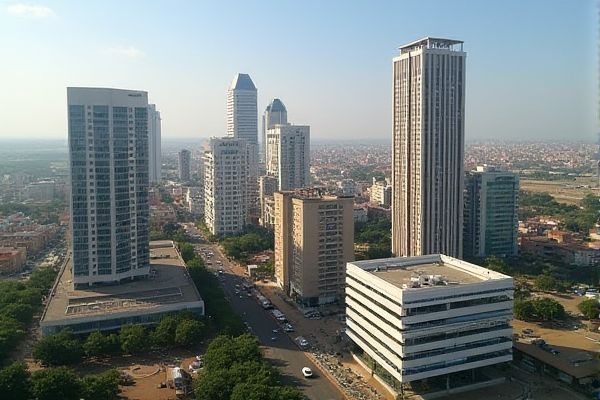
Urban planning job opportunities in Kenya have been expanding in recent years, driven by rapid urbanization and the need for sustainable city development. Positions often focus on land use planning, transportation planning, and environmental management, requiring skills in geographic information systems (GIS) and data analysis. Organizations such as government agencies, non-profits, and private firms frequently seek urban planners who can contribute to smart city initiatives and community development projects. Networking through professional associations and attending relevant workshops can enhance job prospects in this evolving field.
Job Description
Urban planning jobs in Kenya involve designing and managing the development of urban spaces to improve the quality of life for citizens. Professionals in this field engage in land use planning, transportation management, and community development, ensuring projects align with local regulations and sustainability goals. Positions often require collaboration with government agencies, private developers, and local communities to create livable, functional, and environmentally-friendly urban areas. Your ability to analyze data, apply geographic information systems (GIS), and engage with stakeholders will be vital in driving successful urban policies and projects in Kenya.
Requirement
Urban planning jobs in Kenya typically require a degree in urban planning, architecture, or a related field. Experience in geographic information systems (GIS) and knowledge of local zoning laws and regulations are often essential. Familiarity with sustainable development practices and community engagement strategies is highly valued in these roles. Strong analytical and problem-solving skills can enhance your competitiveness in the job market.
Salary and Perks Expected
Urban planning jobs in Kenya typically offer salaries ranging from KES 100,000 to KES 300,000 per month, depending on your level of experience and expertise. Professionals in this field may also benefit from additional perks such as health insurance, retirement plans, and opportunities for professional development. Urban planners in major cities like Nairobi and Mombasa often enjoy job stability due to ongoing infrastructure projects and government initiatives. Engaging in this sector allows you to contribute to sustainable development while securing a rewarding career in a rapidly growing economy.
Similar Job Names
- Urban Planner
- Urban Designer
- Transportation Planner
- Land Use Planner
- Environmental Planner
- City Planning Consultant
- Planning Technician
- Housing Development Officer
- Community Development Officer
- Geographic Information Systems (GIS) Specialist
- Policy Analyst
- Development Control Officer
- Urban Development Officer
- Project Manager (Urban Projects)
- Surveyor
- Infrastructure Planner
- Urban Affairs Coordinator
- Social Planner
- Urban Policy Researcher
- Master Planner
Job Expectation Concept
Urban planning jobs in Kenya involve shaping sustainable cities and improving living conditions through effective land use management. Professionals in this field must analyze demographic trends, infrastructure needs, and environmental considerations to create actionable plans. You may find opportunities in government agencies, NGOs, and private firms, emphasizing collaboration with various stakeholders. A strong understanding of local regulations and community needs is essential for successfully implementing urban development projects in Kenya.
Career Advantage and Weakness
Urban planning jobs in Kenya offer significant career advantages, including the opportunity to contribute to sustainable development and shape the future of rapidly growing cities. The demand for skilled urban planners has increased due to urbanization, government projects, and international investments, leading to various job openings within both public and private sectors. However, challenges such as inadequate infrastructure and limited budgets can hinder effective project implementation, impacting overall job satisfaction. You may encounter a competitive job market, which requires continuous professional development to stay updated on best practices and emerging trends in urban planning.
Important Thing Must Know
Urban planning jobs in Kenya are crucial for the country's rapid urbanization, with professionals tasked to design and implement sustainable development strategies. These roles often involve collaboration with government agencies, non-profits, and local communities to address issues such as housing, infrastructure, and environmental sustainability. A degree in urban planning, geography, or a related field is typically required, alongside skills in GIS (Geographic Information Systems) and project management. Knowledge of local regulations, policies, and cultural contexts enhances your ability to create impactful plans that improve living conditions. The demand for skilled urban planners in Kenya continues to grow, presenting ample opportunities for those passionate about shaping vibrant, inclusive cities.
Alternative Career Options
Kenya's evolving urban landscape presents various alternative career options for professionals in urban planning. You can explore opportunities in environmental consultancy, contributing to sustainable development and resource management. Positions in real estate development emphasize land use planning and community engagement, allowing you to directly influence urban growth. Engaging with NGOs or government agencies focused on housing and infrastructure can also provide impactful roles in shaping cityscapes.
Companies List
- Nairobi City County Government
- Kenya Urban Roads Authority
- Kenya Railways Corporation
- National Environment Management Authority
- UN-Habitat
- Africa Development Bank
- World Bank Kenya Office
- Kenya Vision 2030 Delivery Secretariat
- Ministry of Transport, Infrastructure, Housing, Urban Development and Public Works
- Metropolitan Growth and Urban Planning Consultants
List of Ideal City
Nairobi stands out as the primary hub for urban planning jobs in Kenya, driven by its rapid population growth and infrastructural development. Mombasa, with its strategic coastal position, offers unique opportunities in sustainable urban projects and tourism planning. Kisumu is emerging as a key player in urban development, focusing on environmental conservation and revitalization of waterfront areas. Smaller cities like Nakuru are also gaining traction, presenting a demand for urban planners to manage growth and enhance livability.
 jobs-kenya.com
jobs-kenya.com